What is Intellectual Disability?

Classification
- Mild
- Moderate
- Severe
- Profound
Intellectual Disability Is a Neurodevelopmental disorder. It was previously it was known as Mental Retardation. The American Association on Intellectual and Developmental Disability (AAIDD) defines intellectual disability as a disability characterized by significant limitations in both intellectual functioning (reasoning, learning, and problem-solving) and in adaptive behavior (conceptual, social, and practical skills) that emerges before the age of 18 years.
This means that the person’s ability to learn and function in daily life at an expected level is limited. The child learns and develops at a slower rate than other children their age and could take longer to learn to speak, walk, eat, dress and would have difficulties learning in school.
The cause of Intellectual Disability can occur any time before the child is 18 years old.
Common causes include:
- Genetic conditions like Down syndrome, fragile X syndrome etc.
- Use of substances (Alcohol, Cocaine, other substances)
- Infections during pregnancy caused by: Toxoplasma Gondii, Rubella, Cytomegalovirus, Herpes simplex virus, HIV, Treponemea Pallidum (syphilis) etc
- Hypoxia
- Infections eg Meningoencephalitis
- Traumatic brain injury
For many children the cause of their intellectual disability is unknown.
Signs & Symptoms
Mild Intellectual Disability
- The children are difficult to distinguish from other children
- Absence of abnormal physical signs
- It is recognized when the child is school aged (6-11 years old approximately)
- Considered to be slow learners
- They can achieve 6th grade level academically
- Generally, they develop communication and social skills
- Can express themselves in everyday situations
- Would develop complete independence for self-care
- Able to blend in socially
- Function in daily life
Moderate Intellectual Disability
- Some abnormal physical signs may be observed
- Delayed motor milestones
- Slow in comprehension
- May have speech delay but acquire language
- Can communicate in basic, simple ways
- Can learn basic reading / writing / math
- Can achieve 2-3rd grade level academically
- Able to participate in simple activities and self-care
- Supervised tasks can be performed
Severe Intellectual Disability
- Significant delay in some areas
- Poor motor development
- Poor communication skills
- Can learn basic alphabet and numbers
- Can be trained with simple self-care
- Daily routines and repetitive activities can be taught
- Needs direct supervision in social situations
Profound Intellectual Disability
- Significant delays are seen in all areas
- Obvious physical abnormalities are present
- Close supervision is needed
- Unable to take care of themselves
- Not capable of independent living.
References
- Diagnostic and Statistical Manual of Mental Health Disorders. DSM 5 TR 2022
- The American Association on Intellectual and Developmental Disabilities (AAIDD) 2010.
- Facts About Intellectual Disability | CDC. https://www.cdc.gov/ncbddd/developmentaldisabilities/facts-about-intellectual-disability.html
- Kaplan and Saddocks. Synopsis of Psychiatry. 12th edition. 2022
- Ovidia Rodríguez Méndez. Salud Mental Infanto-Juvenil. La Habana: Editorial Ciencias Médicas; 2005.
